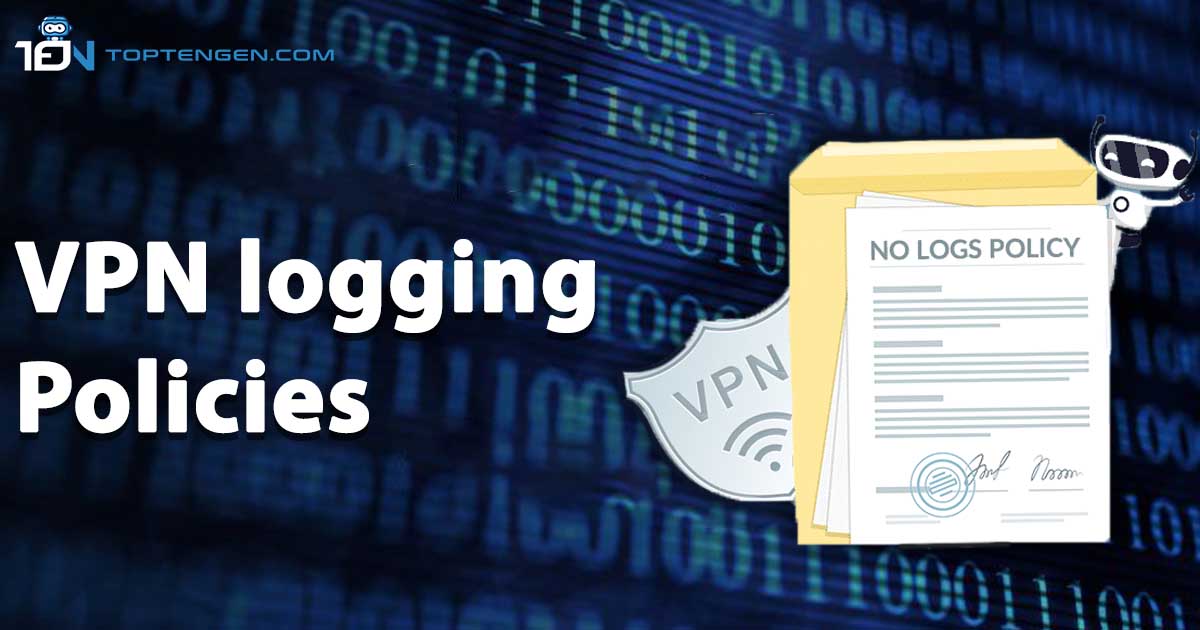Understanding several aspects while selecting a VPN service is crucial for the finest experience. For instance, streaming, privacy features, design, app, speed, device compatibility, etc. However, while securing your online privacy you might miss one crucial characteristic “no logging or zero logging policy”, (VPN logging policies). This article will highlight the importance of VPN logging policies and answer why VPN logging policies are important by highlighting their 5 prominent aspects.
What are VPN logging Policies?
VPN logging policy refers to the procedures and rules adjusted by the VPN provider. These rules are about the type of data the relevant providers collect and store from a user. The data ranges from connection logs (IP addresses and duration and time of VPN use) to usage logs (data transmission and your visited websites during VPN sessions). The logging policies extent significantly impacts the privacy of a user.
If a VPN provider conserves extensive logs, it means they contain user data’s treasure trove at their disposal. If the data is not secured properly then it can be misused in several ways. For example, sold to third parties or forwarded to authorities in case of need. Consequently, understanding these policies is not only necessary for the tech-savvy move but also required to maintain your privacy online.
Why VPN Logging Policies are Significant?

Simply stated, VPN logging policies are effective because a VPN with a poor logging policy is surely a risk for users. One of the top risk factors is ‘breach of the truth’. While using a VPN the user entrusts the provider with his data and expects them to hold it safe. However, in case the provider misuses the data while maintaining extensive logs it is an obvious violation of trust.
VPN logging policies influence directly how legal requests for user data are taken care of. The VPN provider in case of a court order or criminal investigation, can become subject matter to legal obligation. Thus, it might require submitting user data containing browsing history if it is stored. Hence, a no-log policy can be a perfect choice to maintain the privacy of your online activities. Even during legal requests if the provider hasn’t stored any data there’s nothing to hand over.
Security
The no-logs VPN policy keeps your online security maintained through traffic encryption and zero traces of IP addresses. Therefore, attackers cannot easily steal your personal information as they don’t get a trace of your online activities.
Privacy
Privacy is the most crucial aspect of VPN logging policies, which means a VPN is not going to collect any of your online activity data. For instance, the files you download, the websites you visit, messages/ chats you have. etc. As a result, your privacy remains protected from prying eyes, including government agencies, your ISP, hackers, etc.
Freedom
Good VPN logging policies help you access blocked content and websites by bypassing censorship. The reason is VPN will hide your IP address and encrypt traffic, and the websites will remain unaware of your access location.
Anonymity
VPN providers with good VPN logging policies will help you stay anonymous. The reason behind this is your original IP address that remains hidden and the traffic gets encrypted. Which creates difficulty for hackers to track down your identity.
Some additional benefits of a VPN service with quality VPN logging policies are:
Malware infection risk gets reduced: A good VPN service helps get malware protection, by hiding your IP address and traffic encryption.
Geo-restricted content access: Primary VPN logging policies provide access to the content blocked in your country/region. For instance, social media platforms, news websites, streaming services, and many more.
Upgraded Streaming Quality: A quality VPN service provides improved streaming quality for audio and videos by bypassing restrictions like throttling imposed by ISPs.
What are the Prominent Aspects to Look Over in VPN Logging Policies?

There are some crucial logging policy points to inspect while evaluating a VPN;
1. No-Log Policies
The benchmark for VPN logging policies is its zero-log or no-log policy. This policy guarantees the provider is not going to store any form of data that passes the server. Accordingly, even if the provider is hacked or subpoenaed there will be no data to steal or hand over. It is important to keep this level of privacy in consideration while selecting a VPN.
2. Data Retention Policies
Data retention is about how long a VPN provider reserves your data. If a VPN provider collects data and doesn’t store it for a longer period then it can be considered as a good option. A shorter data retention period is directly proportional to better privacy. An ideal VPN provider deletes data within a few hours or days after the end of a session.
3. Data Access Policies
Another important aspect of VPN logging policies to notice is who is going to have access to logged data. Some VPN providers keep data to themselves while some of them might be accelerating data to third parties or law enforcement agencies. Therefore, must check the legal profile of a VPN provider to better understand how your data is going to be treated there.
4. Transparency
Another critical factor is a trustworthy VPN provider remains transparent about its logging policies. The provider should clearly explain what type of data they collect. They should make it clear what is the purpose behind their collection, and how long it’ll be stored. Moreover, they should state the procedures of legal requests for data. The wise move while selecting a VPN is to read the terms of service and privacy policy. If someone remains unclear then should contact customer support before final decision.
5. Jurisdiction
The country or jurisdiction of the VPN provider significantly impacts its VPN logging policies. Because every nation has specific data retention rules and regulations and VPN providers are also bound to them. For instance, countries like the UK or the US are part of the Five Eyes alliance (a group of countries sharing intelligence while having stringent laws of data retention). VPN providers in such countries might be compelled legally to keep logs no matter what.
What are the Red Flags to Look Over in VPN Logging Policies?
There are some red flags to keep in mind while evaluating a VPN;
Vague Logging Policies
VPN providers delivering logging policies through ambiguous or foggy language signal an unscrupulous attitude. Further, this indicates that the provider might follow suspicious data practices. It is best to steer clear from such providers as they may obscure the extent of data collection.
Excessive Data Collection
A VPN provider collecting more data than needed for function or service is a clear red flag. For example, a few VPNs collect usage logs of online activities which is intrusive and unnecessary. While selecting a VPN make sure to avoid these types of providers.
Poor Privacy Jurisdiction
As discussed above, VPN providers in a country with opposing laws might keep log details due to pressure. To avoid such situations, one must go through the jurisdictions of every VPN provider’s country. This way you can enhance your privacy with VPN logging policies check and balance.
Best Anonymous VPN Services

Anonymous VPNs are pretty much secure as they provide quite decent speed over local servers. Such VPN services can be a good option for torrenting and containing easy-to-use apps. Some of the quality anonymous VPN services can easily acquired through cryptocurrency payments, prepaid debit cards, Google Pay, etc. Express VPN is our top pick as the best anonymous VPN service, as it can be a reliable choice to leave no trace of your activities even for the VPN.
Here are a few additional tips for selecting a VPN provider with beneficial VPN logging policies;
- Find a VPN service with transparent and easy-to-understand VPN logging policies.
- Select a service with a zero-logs policy, that will work without collecting your online activities data.
- You can go through the user’s review to better understand a VPN service and its hidden logging practices.
- Directly contact the VPN provider for queries about their VPN logging policies and services.
Through these tips, you can select a service with fine VPN logging policies to keep your privacy maintained.
In a nutshell, VPN logging policies are a crucial part of any VPN provider, that should be checked before signing up for the service. Because a VPN service is going to get access to your sensitive data and privacy. Most of all, it is going to keep your original IP address tracked. Therefore, only select a VPN that comes with zero or no-logs policies to protect your identity while accessing restricted content.



